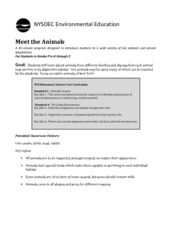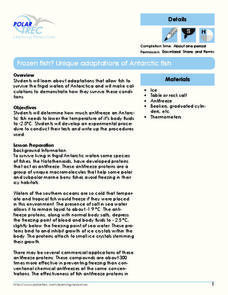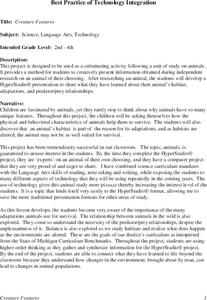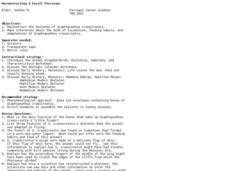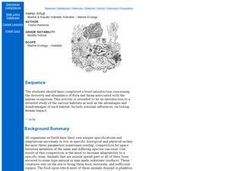Curated OER
Mangrove Ecology and Adaptations
Students create a plant or animal that would be well adapted to a habitat they selected. They first learn about Mangroves and their specific adaptations that help them survive in their habitat.
Curated OER
Mangrove Ecology & Adaptations
Learners creat a plant, animal, or other living organism that would be well adapted to a habitat that they previously selected. First they learn about adaptations of Mangroves.
Curated OER
Who Lives with Mallard?
Students color a picture of the habitat featuring mallard and other creatures, some of whom might be camouflaged or half-hidden. They discuss other forms of animal adaptation.
Curated OER
Guess Who?
Getting ready for a lesson plan on animal adaptations can be a lot of fun. Kindergartners will go on an egg hunt. Once they have collected all the eggs, they will open them up to reveal an image of an animal. Each pupil will act out...
Curated OER
Meet the Animals
The class will examine a series of live or stuffed animals in order to learn how different animals survive in distinctive habitats. As they examine each animal, they will be asked a series of critical thinking questions geared at getting...
Curated OER
A Matter of Survival
Fourth graders dance with inspiration from wild animals. In this creative movement lesson plan, 4th graders watch a video clip and then move like an animal might move in their natural surroundings.
Curated OER
WWW = World Wide Wildlife
Through video, internet research, and hands-on activities, learners conduct a study of the interdependence between animals and the habitats they live in. They conduct Internet research independently in order to complete a report on a...
Umaine Museum of Art
Bony Fish Anatomy Worksheet
Take time to appreciate the beauty in the anatomy of animals with this cross-curricular art and science activity. After viewing examples of fish-themed artwork, children complete the included worksheet by labeling the different parts of...
National Wildlife Federation
Prairie Chicken Pageant
Diminishing habitats is a real concern that is threatening endangered species. Learners examine these concerns by studying the prairie chicken. Groups get a card with characteristics and threats to the species that they turn into skits.
Polar Trec
Frozen Fish? Unique Adaptations of Antarctic Fish
Some fish contain proteins that act like antifreeze in order for them to live in the frigid waters of Antarctica! High schoolers determine how much antifreeze a fish needs to lower its body temp to -2.5 degrees. Teachers act as a...
Curated OER
"Habitats"
Students complete a unit of lessons on animals and animal conservation. They observe a square meter of ground outside the school, set up a model environment, analyze an owl pellet, grow bread mold, and explore various websites.
Curated OER
Disney's Animal World Part 2: That's My Baby
Students see that baby animals go through different stages of growth during their life, just as people do. They use the downloadable Cyberinstructional activity Worksheet to reinforce what they have learned about animals and their...
Curated OER
Creature Features
Students investigate animals and how they adapt to their environment. They design a multimedia presentation that includes information about an animal of their choice. They include a title card, habitats, adaptations, and a predator/ prey...
Curated OER
Staying Warm-Keeping Cool
In this Internet research worksheet, students go to the indicated website and read about animal habitats. Students answer 6 questions.
Curated OER
Zoo Habitat Design
Students design a zoo habitat for an animals. In this zoo habitat lesson, students develop an idea for a zoo habitat that would meet the needs of a specific animal. They solve problems that might be encountered by using their knowledge...
Curated OER
Animal Adaptations
Students expand their knowledge of animal features and behaviors that can help or hinder their survival in a particular habitat. They participate in classroom discussions and visit a website to research animals
Curated OER
Reconstructing a Fossil Pterosaur
Students reconstruct the skeleton of the fossil Scaphognathus crassirostis. In this fossil lesson plan, students discuss the Kingdoms of life, geologic history and the history of the skeletons of species. Students are given 20 minutes to...
Curated OER
Bluebirds Project
In this controls and systems worksheet, students respond to 6 questions where they consider the controls and systems that bluebirds adapt to in order to survive.
Curated OER
Flutterings and Flowers
Fourth graders investigate the significance of natural resources and the habitats of butterflies. They create a list of their own favorite foods, then watch a video about habitats. Students identify things in the video that animals and...
Curated OER
Regents High School Examination: Living Environment 2003
The living environment, from the interior of a cell to the complex relationships among populations, are queried in this final examination. Learners look at air pollution maps, diagrams of cells, population graphs, and drawing of cells....
Curated OER
Marine & Aquatic Habitats Activities - Marine Ecology
Students enact the life cycle of a sessile animal and quantify the possibility of survival under the conditions given. They then present to the class a new adaptation which will increase the animals chance of survival.
Curated OER
Grzimek's Animal Life: Polar Bears
Students examine the physical adaptations of polar bears. In this animal adaptations lesson, students access interactive resource pages on the Internet, discovering the habitats of polar bears and their physical attributes. Students...
Curated OER
Animal Adaptations
Tenth graders participate in an arthropod scavenger hunt. In groups of two, they identify and collect two specimens of arthropods in the school area, and create a table of all the specimens and what class they belong to.
Curated OER
Habitats and Deep Sea Environments
Students examine and identify the characteristics of the four zones of the ocean. They discover the amount of diversity in marine habitats. They also explore the adaptations organisms have that have allowed them to survive.






